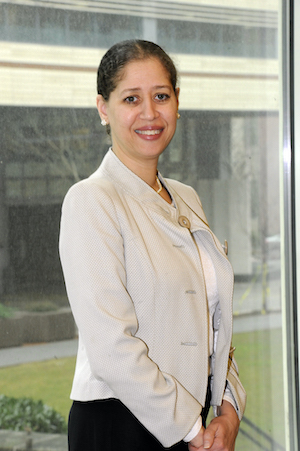DAC Spotlight: Diane Marie St. George, PhD
May 05, 2021 Diversity Advisory Council
For School of Medicine epidemiologist, health equity is a defining professional and personal focus.
This is the latest in a series from the University of Maryland, Baltimore's Diversity Advisory Council (DAC) highlighting a student, faculty, or staff member. Read previous DAC Spotlights.
“Throughout my career, health equity has always been a driver,” says Diane Marie St. George, PhD. “It’s a consistent theme that threads through all of my work.”
As an associate professor in the University of Maryland School of Medicine’s Department of Epidemiology and Public Health, director of the Master of Public Health Program, and vice chair of academic programs in that department, St. George continues to focus on a range of efforts that address health disparities at the community level.
She earned Bachelor of Science degrees in psychology and zoology and a Master of Art degree in health education from the University of Maryland, College Park, and a PhD in epidemiology from the University of North Carolina, Chapel Hill. In her research, she has worked extensively on advancing the health and equity of populations that suffer a disproportionate burden of disease because of race, ethnicity, socioeconomic status, and other social factors that place them at a societal disadvantage.
As an educator, St. George was one of the chief architects in the reorganization of her department’s graduate programs’ curricula to meet new accreditation criteria — and in doing so, recalibrated the course sequence so that students began their studies with the class Health Equity and Social Justice.
“We want our students to understand that to be able to do the work of public health, everything has to be grounded in an understanding of these issues,” she notes. “So, as they move into their introductory courses in biostatistics, program planning, and qualitative research, they are engaging in those studies through that lens.
In addition, a second course, Professional Skills for Public Health, integrates service learning within the local community as a requirement.
Additionally, the revised curriculum includes two required experiences — a walking tour around the West Baltimore neighborhood where UMB’s Community Engagement Center is located, led by community engagement staff and members of the community, as well as a half-day bus tour that visits various Baltimore agencies engaged in nonprofit public health work.
Aside from her academic duties, St. George also heads the Diversity and Inclusion Committee of the national Association of Schools and Programs of Public Health (ASPPH), which advises the ASPPH board on strategies related to increasing diversity among students, staff, and faculty, as well as cultivating a culture of inclusion in curricula, policies, and practice.
For the past six months, the committee has focused on drafting a sweeping organizational statement on “Zero Tolerance for Discrimination, Harassment, and Racism in Public Health.”
“We are analyzing each of the domains that are relevant for academic public health, including student education, professional workforce training, and faculty issues related to accreditation,” says St. George.
“As a professional association, ASPPH needed to take a stand and provide guidance to the member institutions to help guide their work,” she continues. “These are issues we've been talking about for a long time, but the events of 2020 have brought them front and center, and we are seeing a greater willingness of those involved to come to the table and lend their voices. The time is now.”